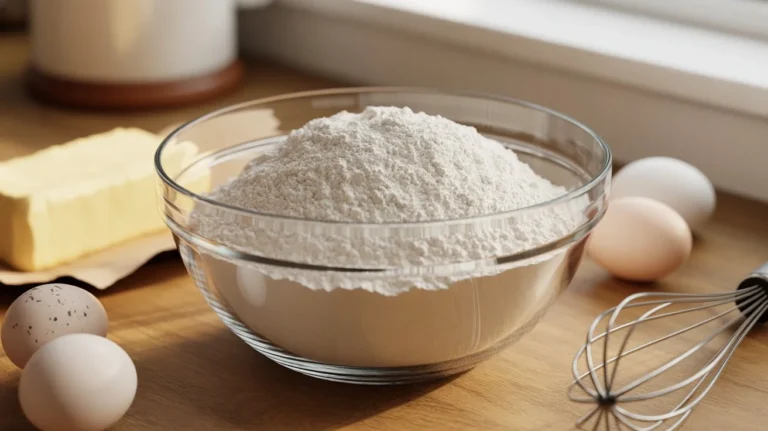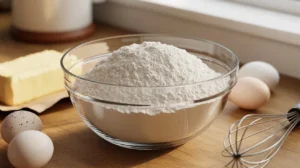When you’re baking a cake, whipping up some muffins, or creating a batch of fluffy pancakes, one ingredient often makes its way into your bowl self-raising flour. But while it’s known for giving baked goods their perfect rise, many home bakers and chefs wonder: how many calories are in 100g of self-raising flour?
If you’re watching your calorie intake or simply curious about the nutritional profile of your baking ingredients, this guide by Crown Foodservice breaks down everything you need to know from calories and macros to how self raising flour plain and carries self raising flour compare. Let’s dive in!
What Is Self-Raising Flour?
Before getting into the calorie count, it’s important to understand what self-raising flour actually is.
Self-raising flour is a type of flour that already contains a leavening agent, usually baking powder and a pinch of salt. This makes it convenient for quick recipes where you don’t need to add a separate rising ingredient.
In essence, self-raising flour = plain flour + baking powder + salt.
It’s ideal for:
- Sponge cakes
- Scones
- Muffins
- Pancakes
- Cupcakes
At Crown Foodservice, we provide quality flour products like self raising flour 25kg bags, perfect for bakeries and restaurants that bake in bulk and value consistency.
How Many Calories Are in 100g of Self-Raising Flour?
Now, let’s get to the main question:
There are approximately 364 calories in 100g of self-raising flour.
However, this number can vary slightly depending on the brand, wheat type, and additional ingredients. For example, Carr’s self raising flour might differ slightly in calories from a store-brand version due to its specific blend of wheat and enrichment process.
Here’s a general nutritional breakdown per 100g of self-raising flour:
| Nutrient | Amount (per 100g) |
| Calories | 364 kcal |
| Carbohydrates | 76.3g |
| Protein | 9.2g |
| Fat | 1.2g |
| Fiber | 2.7g |
| Sugar | 0.5g |
| Sodium | 450mg (from added salt and baking powder) |
These numbers show that self-raising flour is primarily made up of carbohydrates, with a modest amount of protein and very little fat.
Self-Raising Flour vs Plain Flour Calorie Comparison
A common question among bakers is whether self raising flour plain has the same calorie count as regular plain flour.
Here’s the simple answer:
| Type of Flour | Calories (per 100g) | Leavening Agent Added |
| Plain (All-purpose) Flour | 364 kcal | No |
| Self-Raising Flour | 364–370 kcal | Yes (baking powder & salt) |
As you can see, the difference in calories between plain flour and self-raising flour is minimal. The small variation comes from the added baking powder and salt.
So, if you’re counting calories, switching between plain and self-raising flour won’t significantly impact your intake.
Is Self-Raising Flour Healthy?
While self-raising flour isn’t a “superfood,” it can still fit into a balanced diet.
Here’s what makes it beneficial when used mindfully:
- Energy source: With over 360 calories per 100g, it provides quick energy, making it great for active lifestyles.
- Protein content: Around 9g of protein per 100g supports muscle maintenance.
- Fortified nutrients: Many brands, including Carr’s self raising flour, are enriched with iron and B vitamins like folic acid and niacin.
However, keep in mind:
- It’s high in carbs, so portion control is key.
- The sodium content can be higher due to the baking powder and salt blend.
If you’re baking often, consider purchasing self raising flour 25kg fromIdeal for consistent quality and cost-effectiveness in both home and commercial kitchens.
How to Use Self-Raising Flour in Everyday Cooking
You can use self-raising flour for more than just cakes! Its built-in leavening agent makes it perfect for various recipes that need a light, airy texture.
Here are some popular uses:
- Pancakes: Gives you a fluffy rise without needing baking powder.
- Biscuits and Scones: Creates a tender crumb that melts in your mouth.
- Quick Breads: Ideal for banana or zucchini bread recipes.
- Batter for Fried Foods: Light and crispy coating every time.
Pro Tip:
If you run out of self-raising flour, you can make your own. Mix:
- 1 cup of self raising flour plain
- 1 ½ teaspoons of baking powder
- A pinch of salt
Blend thoroughly, and you’ve got homemade self-raising flour ready to use.
Nutritional Tips for Baking with Self-Raising Flour
If you’re calorie-conscious but love baking, here are a few tips to make your recipes lighter:
- Swap sugar for natural sweeteners like honey or mashed banana.
- Use wholemeal self-raising flour for added fiber and nutrients.
- Reduce fat by using Greek yogurt or applesauce instead of butter.
- Measuring 100g of flour can easily turn into 150g if scooped improperly.
- Pair with protein and serve baked goods with Greek yogurt or nut butter to balance macronutrients.
By using premium flour, you can maintain consistency in both nutrition and baking quality..
Buying in Bulk: Why Self Raising Flour 25kg Bags Are Worth It
For professional bakers, restaurants, and cafes, buying self raising flour 25kg is a smart choice.
Benefits of Buying in Bulk:
- Cost-Effective: Larger bags save money in the long run.
- Less Packaging Waste: Eco-friendly and efficient.
- Consistency: Every recipe turns out the same with a single batch of flour.
- Ideal for Commercial Kitchens: Perfect for daily baking operations.
We offer premium-quality self-raising flour in bulk, including options comparable to Carr’s self-raising flour, ensuring smooth texture, reliable rising power, and rich taste.
We offer premium-quality self-raising flour in bulk, including options comparable to Carr’s self-raising flour, ensuring smooth texture, reliable rising power, and rich taste.
Carrs Self Raising Flour – A Premium Baking Choice
When talking about trusted flour brands, Carr’s self raising flour often comes up. Known for its high-quality wheat and precise milling, it’s a favorite among professional bakers.
Here’s why it stands out:
- Fine texture for even mixing.
- Consistent rise in cakes and pastries.
- Enriched nutrients for a healthier baking option.
Partnering with leading suppliers ensures that whether you’re a home baker or a commercial kitchen, your self-raising flour never disappoints.
Final Thoughts
Self-raising flour is a baking essential that delivers consistency, convenience, and a perfect rise for every recipe. With about 364 calories per 100g, it’s a balanced ingredient that fits easily into most diets when used in moderation.
Whether you’re baking fluffy pancakes, light scones, or golden sponge cakes, quality matters. Trusted brands like Carr’s self raising flour ensure dependable results, with premium self raising flour 25kg options ideal for both professional and home bakers. home and professional kitchens. Contact Crown Foodservice today for top-quality flours and baking essentials trusted by chefs nationwide.
FAQs
1. How many calories are in 100g of self-raising flour?
There are about 364 calories in 100g of self-raising flour. The exact number may vary depending on the brand, such as Carr’s self raising flour, and whether it includes added nutrients or salts.
2. Is self-raising flour the same as plain flour?
No. Self raising flour plain refers to flour that has a leavening agent (like baking powder) and salt mixed in. Plain flour doesn’t contain these, so it won’t rise on its own.
3. Can I substitute self-raising flour for plain flour in recipes?
Yes, but you’ll need to adjust the recipe. If you’re using self-raising flour instead of plain, skip the added baking powder and salt. Otherwise, your baked goods might rise too much or taste salty.
4. How should I store self-raising flour to keep it fresh?
Keep self-raising flour in an airtight container in a cool, dry place. If you buy self raising flour 25kg bags, consider transferring smaller portions into sealed containers for daily use.
5. Is self-raising flour suitable for all baking recipes?
Not always. It’s perfect for recipes that need a rise, like cakes and scones, but not for yeast-based breads. For bread, stick to strong plain or bread flour.







